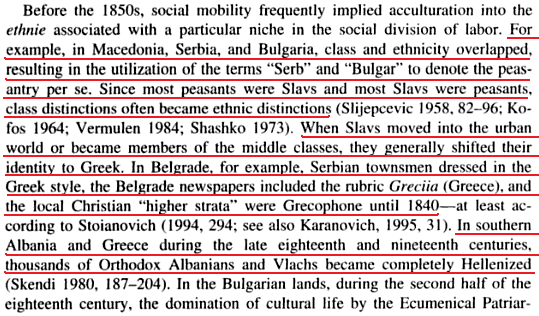Below is collection of information from this forum and other sources, presenting a chronology of Serbian historical events where reference to the inhabitants and areas as Bulgarian and/or Greek is prevalent. The purpose is not to demonstrate that Serbs are the latter two, but that such terms are as insignificant to them as they are to the Macedonians and any others they applied to in the relevant centuries.
9th Century
The town was mentioned again not until the IX century, under the Slavic name BEOGRAD (White Town - probably because of the walls made of white limestone). It was in a letter of April 16, 878 which Pope John VIII wrote to the Bulgarian prince Boris-Mihailo, about the dismissal of a Christian bishop Sergije.
14th Century
17th Century
19th Century (Early)
19th Century (Mid)
Victor Roudometof, Nationalism,Orthodoxy, and Globalization

TrueMacedonian, Daskalot and others, if you guys have more please add it here. One question I would like answered is how many times was the language of the Serbs referred to as 'Serbian' prior to the 19th century? Puchki was the common term as far as I know, any further information would be useful.
9th Century
The town was mentioned again not until the IX century, under the Slavic name BEOGRAD (White Town - probably because of the walls made of white limestone). It was in a letter of April 16, 878 which Pope John VIII wrote to the Bulgarian prince Boris-Mihailo, about the dismissal of a Christian bishop Sergije.
Later, this name appeared in several variants: ALBA GRAECA, GRIECHISCH WEISSENBURG, NANDOR ALBA, NANDOR FEJERVAR, CASTELBIANCO, ALBA BULGARICA.
The Travels of Sir John Mandeville, by Sir John Mandeville, 1357
And the King of Hungary is a great lord and a mighty, and holdeth great lordships and much land in his hand. For he holdeth the kingdom of Hungary, Sclavonia, and of Comania a great part, and of Bulgaria that men call the land of Bougiers……….
And after, go men to Belgrade, and enter into the land of Bougiers; and there pass men a bridge of stone that is upon the river of Marrok.
And the King of Hungary is a great lord and a mighty, and holdeth great lordships and much land in his hand. For he holdeth the kingdom of Hungary, Sclavonia, and of Comania a great part, and of Bulgaria that men call the land of Bougiers……….
And after, go men to Belgrade, and enter into the land of Bougiers; and there pass men a bridge of stone that is upon the river of Marrok.
http://www.vostlit.info/Texts/rus/Le...frametext1.htm
Simeon Lehaci, Balkan Traveller of Armenian origin, 1608-1620.
In Bosnia, everywhere there are also many Bulgarian monasteries .... In Bosnia, all the people speak in Bulgarian........
Simeon Lehaci, Balkan Traveller of Armenian origin, 1608-1620.
In Bosnia, everywhere there are also many Bulgarian monasteries .... In Bosnia, all the people speak in Bulgarian........
Mark Mazower, The Balkans
As late as 1810, for instance, there were only two elementary schools in the Pashalik of Belgrade(the core of future Serbia), and in both the language of instruction was Greek.
As late as 1810, for instance, there were only two elementary schools in the Pashalik of Belgrade(the core of future Serbia), and in both the language of instruction was Greek.
Victor Roudometof, Nationalism,Orthodoxy, and Globalization

TrueMacedonian, Daskalot and others, if you guys have more please add it here. One question I would like answered is how many times was the language of the Serbs referred to as 'Serbian' prior to the 19th century? Puchki was the common term as far as I know, any further information would be useful.


Comment